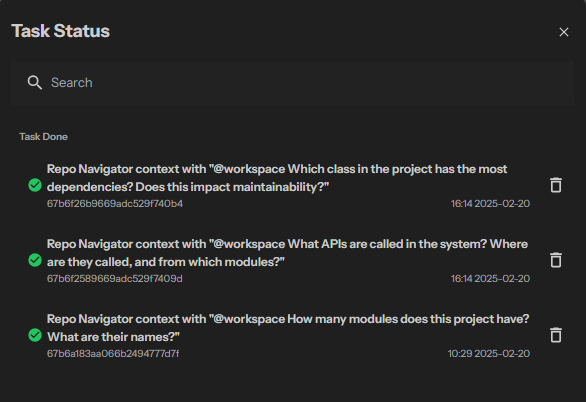
Developers across all levels and domains inevitably encounter the complexities of large repositories, each facing unique yet interconnected challenges. As repositories grow in size and complexity, developers at every level must adopt strategies like sparse checkouts, incremental builds, and distributed CI/CD architectures to maintain efficiency and prevent workflow bottlenecks.
Recognizing the challenges developers face, CodeVista introduces Repo Navigator feature to streamline repository exploration and code comprehension. Based on the context of the question, CodeVista intelligently identifies and retrieves relevant files and symbols, incorporating them into responses as linked references and code snippets.
By leveraging @workspace as a grounding mechanism, CodeVista Chat transforms into a domain-specific assistant, optimized for tasks including but not limited to:

Repo Navigator provides a graph-based representation and retrieval system for codebases, enabling seamless integration with Large Language Models (LLMs) and AI-powered coding assistants. By leveraging RAG-Graph (Retrieval-Augmented Generation Graph), it enhances LLM capabilities and helps developers tackle complex tasks efficiently.
Its functionality consists of three key processes:
Step 1: Upload code files that are currently open in your workspace to the CodeVista context system.
(Supported coding file types: C, C++, Java, JavaScript, PHP, Python, Ruby, Go, ust, TypeScript, Kotlin)
Once the Workspace Q&A Status is Ready, your workspace has been fully indexed and CodeVista now has a complete understanding of its content. The system is now prepared to answer questions accurately based on the indexed data and provide insights, cross-references, or direct responses to queries about the workspace.
.png)
Step 2: Input @workspace questions and submit to CodeVista.
See Tips for Using Repo Navigator for more ideas to optimize responses from CodeVista.

Step 3: Review response from CodeVista and ask for more information if needed.

All @workspace Q&A are saved and can be reopened in Task Status for review.


The way you phrase your question can significantly influence the quality of the references @workspace provides and the accuracy of the response. To optimize results, consider the following tips: